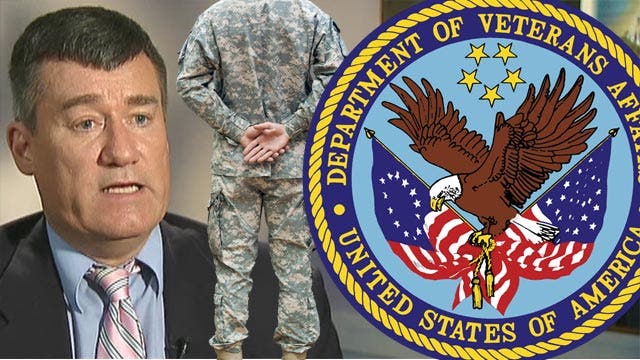The highest-level whistle-blower ever to come forward at the Department of Veterans Affairs is leveling accusations of serious ethical lapses, claiming an agency intentionally manipulated and suppressed data which resulted in veterans -- particularly suicidal veterans -- being denied critical care.
The whistle-blower, Steven Coughlin, was a senior epidemiologist at the VA and lead author on two of the biggest studies the VA has conducted on veterans of the Gulf, Iraq and Afghanistan wars. His claims concern the VA's Office of Public Health.
Among a laundry list of claims that Coughlin told a House oversight committee Wednesday was that he was warned by a superior not to include data in his study that could have helped establish a link between so-called "burn pits" in Iraq and asthma and bronchitis among veterans. Such a link could put the VA on the hook for costly medical treatments.
"I was told two or three times in the second half of 2012 by my immediate supervisor not to look at data," Coughlin told Fox News in an exclusive interview. "And I found that very uncomfortable -- very unnerving."
When Coughlin complained to his supervisor Dr. Aaron Schneiderman about the omission, Coughlin alleges that Schneiederman threatened him.
What particularly distressed Coughlin, though, was the VA's lack of action regarding veterans who had indicated on study questionnaires that they were considering suicide. Two-thousand respondents said that they felt "they would be better off dead." According to Coughlin, in 95 percent of those cases, the VA did nothing to follow up. While the VA says it has no evidence that any study participants subsequently committed suicide, Coughlin is certain that people did take their lives.
While planning for a second study, Coughlin attempted to ensure that any similar respondents would receive a follow-up. For his efforts, Coughlin said his supervisors initiated disciplinary action against him.
"Reprisal against whistleblowers, unfortunately, has been commonplace at the department," Coughlin told Fox News.
Fed up with the situation, Coughlin quit the VA in December.
The VA stressed Wednesday that the department does not tolerate retaliation. In a statement to Fox News, the VA also touted its research standards while pledging an investigation into any alleged wrongdoing.
"The Department of Veterans Affairs has a decades long history of conducting world-class research studies that meet accepted and rigorous scientific standards," the statement said. "Research on the health of Gulf War Veterans has been and continues to be a priority for VA. The Department depends on this research to inform our decisions and guide our efforts in caring for Gulf War Veterans. All allegations of malfeasance are taken seriously and are investigated fully."
The chairman of the House subcommittee, Rep. Mike Coffman, R-Colo., himself a veteran of the Gulf and Iraq wars, said he is shocked but not surprised by the latest allegations. Though he has chaired the committee only a few short weeks, he has already investigated a number of ethical lapses at the VA.
"There's no reason why a Gulf War veteran should ever trust the Veterans Affairs Administration, or unfortunately, this government," Coffman told Fox News.
If the allegations leveled against the department by Coughlin are true, Coffman said, heads should roll.
"They need to clean house," Coffman told Fox News. "They need to exercise ethical leadership."
Coughlin charges that one of the worst offenses is that the VA has sat on a valuable study that would for the first time with the VA's own research establish strong evidence of a neurological foundation for Gulf War illness. The VA has so far held to the theory that the cause for Gulf War illness -- now termed "chronic multi-symptom illness" -- is unclear. Coughlin insists the VA will not publish anything that contradicts what he calls the VA's "unwritten internal policy."
"You may hold the belief as some people do that Gulf War illness is a psychiatric condition," said Coughlin. "But if you carry out the research study and the data strongly supports the conclusion that it's neurological in nature, then you're supposed to publish that and get it out."
Gulf War veterans like Paul Sullivan -- also a former employee at the VA -- are pleased that Coughlin is coming forward.
"Veterans have waited 22 years for answers on treatment," Sullivan told Fox News. "And now, finally, we have a high level VA official that is going to blow the doors wide open on how VA is blocking research and benefits for Gulf War vets."
Coughlin is still out of work after leaving the VA. He paid his own way to come to Washington to tell his story. His only interest, he said, is insuring that America's veterans get the health care they deserve.
"I can tell you that many Gulf War veterans are infuriated by this," he told Fox News. "It has complicated their lives and made it much more difficult for them to get competent health care from VA providers."













































